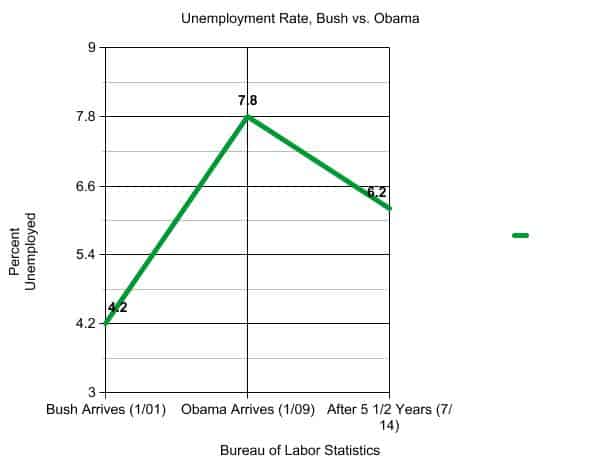http://www.washingtonpost.com/blogs/wonkblog/wp/2014/10/15/nations-budget-deficit-falls-to-lowest-level-since-obama-took-office/?tid=rssfeed
The White House hailed a return to "fiscal normalcy" Wednesday, reporting that the federal budget deficit shrank to $483 billion last year, the lowest level as a share of the economy since 2007, before the Great Recession.
Driven by higher tax revenues, the shortfall for the fiscal year that ended in September was sharply lower than the $680 billion tallied in fiscal 2013 and about a third the size of the record $1.4 trillion deficit hit in 2009, the year President Obama took office. At roughly 2.8 percent of the overall economy, last year's deficit also achieves a White House goal for deficit reduction two years earlier than expected.
In a briefing for reporters, Treasury Secretary Jack Lew and White House budget director Shaun Donovan touted the year-end numbers, noting that the good news comes at a time when government spending has risen slightly and Washington has abandoned "harmful excessive budget austerity," as Donovan put it.
While Obama remains committed to bringing down the nation's debt -- which remains dangerously elevated at $17.8 trillion -- Lew said, "What I don't think we have is an emergency right now ... The challenge we have is to sustain the economic engine."
Lew declined to answer questions about rising global financial fears and the tumbling U.S. stock market. A Treasury spokesman cut off questions about the broader economy, instructing reporters to stick to the happy fiscal news.
Lew and Donovan meanwhile argued that Obama's policies -- from the 2009 stimulus package to the Affordable Care Act to the continuation of the George W. Bush-era tax cuts for most Americans -- had helped the U.S. economy rebound from the darkest days of the recession, which in turn produced more tax revenue and smaller budget deficits.
“Not since World War II, more than 60 years ago, has there been faster and more sustained deficit reduction," Lew said. “The American economy today is better positioned than any other advanced economy in the world.”
According to the Treasury Department, government expenditures rose to $3.5 trillion in fiscal 2014, up about 1 percent from the previous year. Tax receipts, meanwhile, rose to more than $3 trillion, up 9 percent over fiscal 2013 thanks in part to falling unemployment and stronger economic growth.
The higher tax collections were also due, however, to the end of a payroll tax cut for most workers and the expiration of a variety of tax business breaks that many companies are pressing Congress to restore when lawmakers return to Washington after the Nov. 4 elections.
The fate of the so-called "tax extenders" is one of several fiscal issues yet to be resolved in a year-end "lame duck" session before a new Congress is seated in January. Political analysts say Republicans could win control of the Senate as well as the House in the elections, creating the possibility that budget fights between the Capitol and the White House could break out anew.
Washington spent much of Obama's first term embroiled in nasty budget fights that pushed the nation to the brink of default and shut down the government for 16 days last fall. They also ushered in sharp automatic budget cuts, known as the sequester, which are scheduled to hit federal agencies again in 2016.
Republicans have vowed to abide by sequester spending levels for domestic agencies if they win control of Congress, though many hope to find extra cash for the Pentagon. On Wednesday, Lew and Donovan cautioned against that approach, arguing that investing in domestic priorities such as education and infrastructure will bolster economic growth without increasing annual deficits.
"Six years after the Great Recession, thanks to the hard work of the American people and, in part to the policies the president pursued, our economy has bounced back more strongly than most others around the world," Donovan said. "We cannot afford a return to manufactured crises or austere anti-growth fiscal policy" when lawmakers come back in November.

 Home
Home





